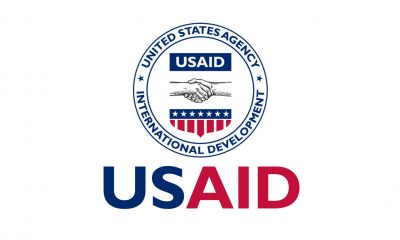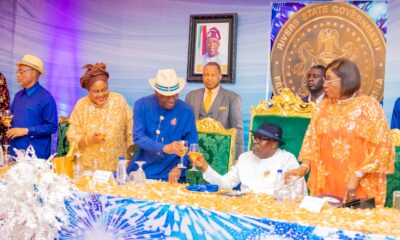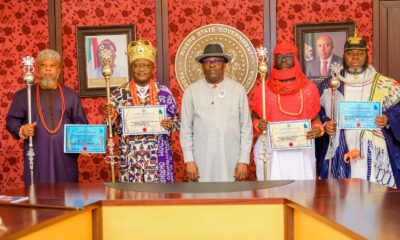Maritime
NIMASA Harps On Transparency, Integrity
Director-General of the Nigerian Maritime Administration and Safety Agency (NIMASA), DakukuPeterside has said that transparency and integrity are crucial to robust maritime sector, in line with the ease of doing business initiative of the Federal Government.
Peterside, who made this call during the visit of a joint team from the Nigerian Shippers Council (NSC), and Independent Corrupt Practices and Other Related Offences Commission (ICPC) in Lagos said: “We must be conscious of our international image because people who do business in our ports have alternatives. We must strive to make our ports user friendly and competitive; to achieve this, we need the support of all stakeholders in the maritime sector.”
He said NIMASA has fully keyed into the initiative of the ease of doing business and would continue to partner with other relevant government bodies in the ports in order to fully realise the essence, which is geared towards making the nation’s ports competitive, adding that it would in turn bring about more employment opportunities and also generate more revenues to add to the nation’s Gross Domestic Product (GDP).
The NIMASA boss called for sanctions for erring port operatives, stating that it will serve as deterrent to others. He said:”Where there are no consequences for offences, people will continue to err; therefore the need to make people face the consequences for their actions or inactions is not negotiable”.
He noted that the agency had reviewed its Standards Operational Procedures’ (SOP) manual and made the operational departments sign a service level agreement whereby boarding any vessel and other transactions will be done in record time, with a view to reducing delay in turn-around-time of vessels and to enhance trade facilitation. This he explained is in order to ensure full compliance to the Federal Government’s ease of doing business agenda.
Acting Chairman of ICPC, Musa Usman Abubakar, stressed the need for all government agencies in the maritime sector to carry out joint inspection of vessels at the ports in order to fully actualize the Ease of Doing Business initiative of the Federal Government. Abubakar noted that this move would aid the turn-around-time of vessels calling at our part and also bring about efficiency.
The ICPC boss, who was represented by the Director, Public Enlightenment and Spokesperson of the Commission, Mrs. RashidatOkoduwa, stated that activities in the ports would no longer be business as usual for operators and others who are yet to comply with the ease of doing business initiative, hence the reason they are seeking partnership with NIMASA and other agencies to join in the resolve to ensure a business friendly and conducive maritime sector in Nigeria.
The Executive Secretary of the NSC, Barrister Hassan Bello, who was represented by the Director, Legal Services of the NSC, Samuel Vongtau, appealed for more collaborative efforts by all the various agencies in the ports in order to realise an economically viable maritime sector in Nigeria.
The Federal Government’s ease of doing business initiative is geared towards ensuring faster processes and procedures in ports activities in the country, whereby vessels calling at the nation’s ports get good time value for their businesses, to allow for an improved turn-around-time in all forms of port transactions. To achieve this, all agencies in the ports are expected to collaborate and ensure seamless transactions in line with global best practices.
Maritime
Waterways Safety: NIWA Wants Partnership With Govs

The Managing Director of National Inland Waterways Authority (NIWA), Mr. Bola Oyebamiji, has called for increased collaboration between the federal agency and state governments to enhance the safety and security of inland waterways transportation.
Speaking at a one-day consultative forum on safety and insecurities on inland waterways, organized by the Nigeria Transportation Commissioners’ Forum in Ilorin, Oyebamiji emphasized the critical role that safety and security play in fostering a thriving water transportation system.
The forum, themed “Prevalent Safety, Security Hazards and Practices in Inland Waterways: Passenger Transport Safety in Ilorin, Kwara State”, sought to address the pressing issues facing the inland waterways sector.
Oyebamiji acknowledged the ongoing efforts by NIWA to improve safety, such as the recent unveiling of the transportation code for public use, the inauguration of several operational assets including survey boats, gunboats, water ambulances, and a passenger ferry.
He also noted that safety campaigns have been launched across all operational bases, targeting local communities in their native languages.
The NIWA boss stated the support from the National Assembly, including the ongoing discussions on establishing coastal guards and the attention safety and security on inland waterways have received from the House Committee on Inland Waterways.
In his closing remarks, Oyebamiji appealed to the Commissioners for Transportation across relevant states to collaborate with NIWA in areas such as training, safety campaigns, infrastructure development, and financial empowerment.
He stressed that while the challenges are significant, they are surmountable through collective action.
Maritime
Coastal Guard Bill’ll Unlock Marine Blue Economy Potential -FG

The Federal Government has conveyed its support for the establishment of the National Coast Guard.
The Government also commended the proponents of the bill for having the hindsight to initiate a course of action that, when passed, will be the catalyst needed in unlocking the nation’s maritime potential.
In a statement by the Head of Press, and Public Relations for the ministry, Muhammad Tahir Zakari, Minister of Marine and Blue Economy, Adegboyega Oyetola, was reported to have made this known at the National Assembly complex at the 1-Day Public Hearing on National Coast Guard Bill (NCG).
The statement stated that the bill when passed, will guarantee maritime safety, sustainable marine resource development and enhance economic growth.
Highlighting the major need for the National Coast Guard, the Minister identified: Maritime safety; Environmental protection through enforcing environmental regulations and conservation of marine ecosystems; and Enforcement of civil maritime laws to uphold laws governing civil maritime activities and enforce fishing regulations while preventing illegal exploitation.
It also include search and rescue to maritime emergencies and also conduct timely search and rescue operations.
He cited a 2009 publication by the African Centre for Strategic Studies, which noted that 15 of the 21 independent maritime nations in sub-Saharan Africa have dedicated coast guards and identify themselves as such.
Despite this, none of these nations have Nigeria’s population or the extent of its inland waterways and coastline.
While acknowledging the significant role of the Nigerian Navy in safeguarding the Nigerian maritime space following the collaborative effort with the Ministry of Marine and Blue Economy in the Deep Blue Project, which has shown great results with zero piracy in Nigeria’s territorial water in the last three years.
He, however, stressed the need for the National Coast Guard to complement the efforts of the Nigerian Navy in playing a critical role in preventing accidents, crime, and other threats to maritime activities
“A vast coastline of 850 km, the equivalent of 10,000 km in two ways. It is also a place of rich and diverse economic sources.
“While these opportunities are promising, they also present challenges such as pollution, overfishing, and unsustainable use of marine resources. The proposed National Coast Guard is equipped to tackle these issues”, he stated.
He urged the Senate and the National Assembly to lend their full support to the bill, noting that, “Nigeria Coast Guard will act as a vital complement to the Navy, of fostering a safe and sustainable maritime environment”.
He appealed for the establishment of a flexible, adaptive implementation strategy that would evolve into a midwife for the bill to succeed, while urging those with reservations to see the pressing need of the institution.
Earlier during the hearing, the President of the Nigerian Senate, Godswill Akpabio, commended members of the Committee on Marine and Transport for their unwavering dedication in piloting the initiative and advocating for the establishment of the National Coast Guard Bill.
Akpabio, represented by Sen. Akintunde Yunus, said the essence of the bill was to make critical decisions that will guarantee the safety of the nation’s waterways and protect the marine resources.
He stated that “the establishment of the National Coast Guard is not merely a legislative formality, but a dire necessity”.
Speaking also, the Chairman, Senate Committee on Marine and Transport, Sen. Sanni Eshinlokun, said the Bill was first read in the Senate on the 3rd of October while the Senate at its plenary deliberated on the General Principles of the Bill.
Senator Eshinlokun said, “The Bill was read for the second time and referred to the Senate Committee on Marine Transport for further legislative action.
Maritime
Private Sector Should Drive Blue Economy -Bello

Former Executive Secretary of the Nigerian Shippers’ Council (NSC), Barr. Hassan Bello, has charged the Federal Government not to designate any of its agencies as the lead agency to drive the blue economy if it actually wants Nigeria to make progress in the sector.
Bello, who made this call in his remarks at the 10th anniversary, lecture and awards of the Primetime Reporters in Lagos, midweek, advised the Federal Government to avoid the mistake made during the Cabotage era when it designated an agency as lead agency and the rest was now history.
He said for the sector to succeed, it required everyone’s contribution, urging the Minister to allow the private sector to drive the blue economy.
According to him, “Two things which we must be very careful about is to make.mistake, like we did with cabotage. If we remember carefully, Cabotage was coastal and Inland shipping, but that inland shipping was not emphasized.
“It was just for supply of oil and gas to the mother vessel, we couldn’t trade as we were doing from Asaba to Baro in Niger State, or carry cement or even petroleum products. So, we cannot restrict that to customs.
“Secondly, don’t give the Blue Economy to an agency to say it is the lead agency because everybody must have contributions to the Blue Economy. As we want to do, we have seen agencies struggling to have seminars on Blue Economy, it’s not even a government thing.
“Allow the private sector to take over this blue economy, don’t create fantastic departments and overload into the private sector. This is what is our problem.
“When we had the Cabotage, it was a NIMASA thing and when you talk about Cabotage, no! don’t go there, what is your own with Cabotage? So, Cabotage was colonized, the Blue Economy should not be colonized. We should have the ramification of that Blue Economy to make sure that everything trickles down”.
He however, noted that there had been a lot of progress by the various organs of government even before the designation of the Blue Economy Ministry saying, “Blue Economy has always been there just as we had the red economy, which is characterized by China’s quest for export for state directed economy.
“We even have the grey economy, which is that which is informal. We have the green economy and all shades of economy. So, it’s not new that we have the Blue Economy, what has been the call by stakeholders is for us to have a ministry that will cater for transportation and transportation is a cardinal or even the paramount part of the Blue Economy.
“I know we have sustainable use of ocean resources and many other things, but when you talk about the Blue Economy, the central point is the use of ocean and the inland waterways and other resources for diversification of our economy as the Convener has said”.
“We have to be conscious, concerted and even calculated to make sure that it works for us. It’s not just fancy thing that there’s a ministry for blue economy. There must be active participation of stakeholders and the involvement of the private sector to harness the resources and not anything fancy or pretentious. The government must involve the private sector.
By: Stories by Nkpemenyie Mcdominic, Lagos
-

 World2 days ago
World2 days agoPope Francis urges global dialogue to prevent world war
-
Rivers2 days ago
JONAPWD Elections: Commissioner Inaugurates 5-Man Committee
-
Politics2 days ago
When Women Unite To Pray For SIM
-

 Business2 days ago
Business2 days agoUSAID Re-emphasizes Agricultural Collaboration With Nigeria
-

 Featured2 days ago
Featured2 days agoWe’ve Only One House Of Assembly Led By Oko-Jumbo, Fubara Clarifies …Signs Into Law N1.188trn Rivers 2025 Budget
-
Business2 days ago
Agency Partners Foreign Varsity On Climate-Smart Agriculture Advancement
-

 Nation2 days ago
Nation2 days agoNUJ backs proposed strike by Lagos-owned media workers
-

 Niger Delta2 days ago
Niger Delta2 days agoFouchee Celebrates Asari’s Recognition

